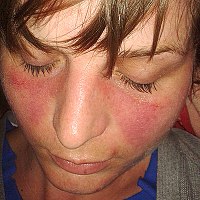
Photo from wikipedia
Background Humoral and cellular immune responses are known to be crucial for patients to recover from COVID-19 and to protect them against SARS-CoV-2 reinfection once infected or vaccinated. Objectives This… Click to show full abstract
Background Humoral and cellular immune responses are known to be crucial for patients to recover from COVID-19 and to protect them against SARS-CoV-2 reinfection once infected or vaccinated. Objectives This study aimed to investigate humoral and T cell responses to SARS-CoV-2 vaccination in patients with autoimmune diseases after the second and third vaccine doses while on rituximab and their potential protective role against reinfection. Methods Ten COVID-19-naïve patients were included. Three time points were used for monitoring cellular and humoral responses: pre-vaccine to exclude virus exposure (time point 1) and post-second and post-third vaccine (time points 2 and 3). Specific IgG antibodies were monitored by Luminex and T cells against SARS-CoV-2 spike-protein by ELISpot and CoVITEST. All episodes of symptomatic COVID-19 were recorded. Results Nine patients with antineutrophil cytoplasmic antibody (ANCA)-associated vasculitis and one with an undifferentiated autoimmune disease were included. Nine patients received mRNA vaccines. The last rituximab infusion was administered for a mean (SD) of 15 (10) weeks before the first vaccine and six patients were CD19-B cell-depleted. After a mean (SD) of 19 (10) and 16 (2) days from the second and third vaccine dose, IgG anti-SARS-CoV-2 antibodies were detected in six (60%) and eight (80%) patients, respectively. All patients developed specific T cell responses by ELISpot and CoVITEST in time points 2 and 3. Previous B cell depletion correlated with anti-SARS-CoV-2 IgG levels. Nine (90%) patients developed mild COVID-19 after a median of 7 months of the third dose. Conclusion Rituximab in patients with autoimmune diseases reduces humoral responses but does not avoid the development of T cell responses to SARS-CoV-2 vaccination, which remain present after a booster dose. A steady cellular immunity appears to be protective against subsequent reinfections.
Journal Title: Frontiers in Immunology
Year Published: 2023
Link to full text (if available)
Share on Social Media: Sign Up to like & get
recommendations!